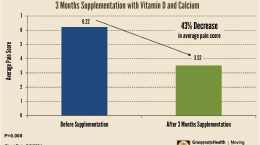Published on November 5, 2024
A new randomized controlled trial demonstrates the effectiveness of omega-3 supplementation for improving fibromyalgia pain, as well as calcium and magnesium levels; other studies also show benefits of vitamin D and magnesium
Key Points
- Previously reviewed studies have shown that vitamin D, magnesium, vitamin B12, and iron were among those having the most significant, beneficial effects on chronic pain and other symptoms commonly experienced by fibromyalgia patients
- Vitamin D levels have been negatively correlated with physical function among fibromyalgia patients, and magnesium levels have been negatively correlated with stiffness; in other words, vitamin D and magnesium deficiency were both related to an increase in fibromyalgia symptoms
- A new RCT showed that supplementation with high-dose omega-3 fatty acids was significantly related to decreased pain scores and an overall improvement in symptoms among fibromyalgia patients
 Chronic, wide-spread pain, consisting for a minimum of 3 months, is the main symptom experienced by individuals with fibromyalgia. Additional symptoms include fatigue, sleep issues, cognitive impairment, depression, migraines, and others. Fibromyalgia patients also have higher risk of cardiovascular disease and metabolic disorder.
Chronic, wide-spread pain, consisting for a minimum of 3 months, is the main symptom experienced by individuals with fibromyalgia. Additional symptoms include fatigue, sleep issues, cognitive impairment, depression, migraines, and others. Fibromyalgia patients also have higher risk of cardiovascular disease and metabolic disorder.
Nutrients Shown to Improve Fibromyalgia Symptoms
We recently reviewed several studies analyzing the effects of specific nutrients on the symptoms of fibromyalgia. These studies showed that vitamin D, magnesium, vitamin B12, and iron were among those having the most significant, beneficial effects on chronic pain and other symptoms commonly experienced by fibromyalgia patients. Vitamin D levels specifically were significantly correlated with chronic pain, depression, and anxiety in fibromyalgia patients, with symptoms improving after supplementation.
Another one of the studies, by Tarsitano et al., compared blood levels of both vitamin D and magnesium to the severity of fibromyalgia symptoms to find that vitamin D levels were negatively correlated with physical function, and magnesium levels were negatively correlated with stiffness. In other words, vitamin D and magnesium deficiency were both related to an increase in fibromyalgia symptoms, most notably physical function and stiffness. Magnesium deficiency can also cause muscle weakness, paraesthesia (the feeling of tingling or pins and needles), and is related to increased inflammation, all of which are associated with fibromyalgia.
New RCT Results: Omega-3 Fatty Acids Improved Fibromyalgia Pain, Symptoms
A new paper by Fattah et al. reviewed results from a randomized, double-blind, placebo control study on the effects of high-dose omega-3 fatty acids on symptoms of fibromyalgia. The study enrolled 120 fibromyalgia patients who were then given either omega-3 supplements or a placebo for 8 weeks. Symptom severity, pain, and other measures were tracked along with serum calcium and magnesium levels.
After 8 weeks of treatment with omega-3 supplements, pain scores significantly decreased along with an overall improvement in symptoms compared to the placebo group. In addition, serum levels of magnesium and calcium increased among the treatment group, but not the control group.
Measure Your Levels of Vitamin D, Omega-3s and Magnesium… Your Nutrient Intake is an Easily Modifiable Factor to Help Improve Your Health
 Having and maintaining healthy vitamin D, zinc and other nutrient levels can help improve your health now and for your future. Choose which to measure, such as your vitamin D, omega-3s, and essential minerals including magnesium and zinc, by creating your custom home test kit today. Take steps to improve the status of each of these measurements to benefit your overall health. You can also track your own intakes, symptoms and results to see what works best for YOU.
Having and maintaining healthy vitamin D, zinc and other nutrient levels can help improve your health now and for your future. Choose which to measure, such as your vitamin D, omega-3s, and essential minerals including magnesium and zinc, by creating your custom home test kit today. Take steps to improve the status of each of these measurements to benefit your overall health. You can also track your own intakes, symptoms and results to see what works best for YOU.
Enroll and test your levels today, learn what steps to take to improve your status of vitamin D (see below) and other nutrients and blood markers, and take action! By enrolling in the GrassrootsHealth projects, you are not only contributing valuable information to everyone, you are also gaining knowledge about how you could improve your own health through measuring and tracking your nutrient status, and educating yourself on how to improve it.





